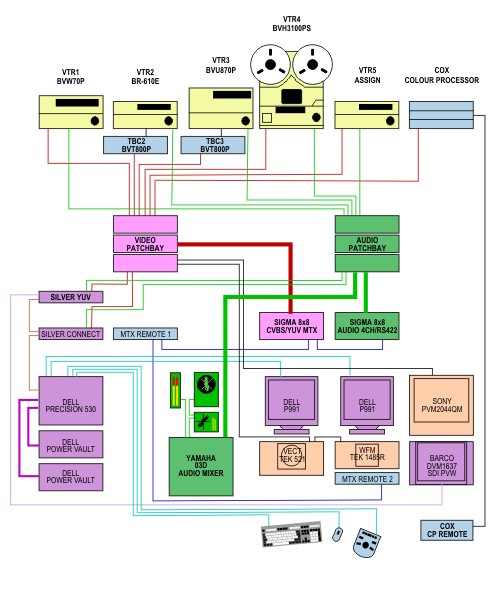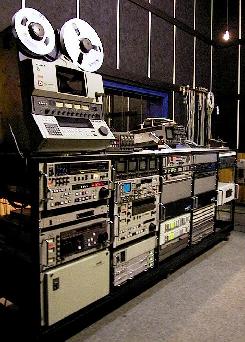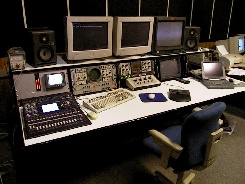|
|
| ///FAST silver.
comprises a PCI hardware codec, to which two external interface boxes are
connected. These interface boxes - FAST Connect and FAST Component - are
active processors which convert incoming video signals from CVBS, Y/C,
YUV or SDI to the digital inpuit format, and the digital output format
to the same choice of alternative formats. This configuration also accepts
up to 4 analogue audio signals at different industry standard line levels
or a stereo AES/EBU digital audio input. Audio output is either stereo
anaolgue or digital AES/EBU. Silver. is a multiformat device, which is
able to handle both NTSC and PAL in either 4:3 or 16:9 aspect ratio - the
desired configuration is set via software to the hardware codecs on start-up. |
| During
the actual editing process, only the digital equipment is necessary (the
units marked in dark purple on the schematic below.) Audio equipment (green)
and video monitoring (orange) is also used to monitor the editing process.
VTR's and video processors (yellow or blue), are only employed during digitisation
(play-in) and record to tape (play-out). This particular system offers
play-in from and play-out to four different videotape formats, plus an
assignable format for special requirements. A video colour processor may
also be inserted into the play-in chain to enable colour processing immediately
prior to digitisation. |
 |
| All
video and audio inputs may be patched manually via MUSA and BPO316 patchbays.
Normal designation of video, audio and RS422 routing is controlled via
a Sigma HPX 8x8 matrix which switched sources and destinations on 4-levels
- Video CVBS, Video YUV, Audio 4 channels and RS422 VTR seriel remote control.
There is a master routing control panel which handles all sources and destinations,
and a local dedicated control panel on output 7 for technical monitoring.
The routing switcher may also be controlled via RS232 seriel connection
from the workstation. |
 |
All
equipment is housed in one of two assemblies - a 5 bay 19" rack unit housing
VTR's processors, patchbays and computer mainframe and storage, and a control
desk housing monitor displays, audio mixer, remote control panels. test
equipment and input devices.
Under normal operation, all
input and output signals for all equipment are available via physical patchbays,
obviating the need for rear access for other than maintenance.
All audio lines are balanced
600 ohm, and all equipment is earthed via standrad EIA 3 pole power connections.
Each rack bay, plus the control desk, peripheral computer equipment and
room lighting is powered via a single phase 10 group distribution board
with separate automatic cutouts for each supply group. |
| This
system offers a high level of redundancy and flexibility - many traditional
editing or dubbing operations may be handled in the analogue domain, and
the editing workstation can also handle digital audio editing and processing
outside the silver. environment with other media tools. EDIT 2 has tie-lines
to adjacent edit suites and studio, as well as our VHS duplication facility,
enabling VHS copying direct from the digital silver. environment. |
| EDIT2
is also equipped with two powerful workstations, one of which has an additional
240GB RAID storage, for graphics and audio editing applications. Remote
control of primary VTR's is possible from both workstations for general
scripting and logging operations. All workstations are interconnected via
our internal network and have access over the network to the Internet via
ISDN. When the majority of the quipment is powered down, the acoustics
of the suite are perfect for voice and simple instrumental recording. EDIT2
also has direct access to adjacent studios and commentary booth. |
|

